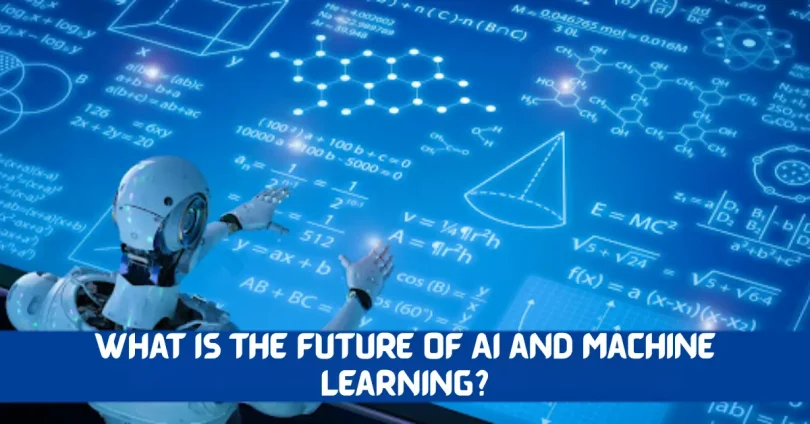In the past few decades, the world has witnessed a technological revolution driven by artificial intelligence (AI) and machine learning (ML). From simple automation to complex decision-making, these technologies have already reshaped industries and daily life. But what is the future of AI and machine learning? What lies ahead as we continue to integrate intelligent machines into every aspect of society?
This article explores the anticipated future of AI and ML, highlighting key innovations, industry applications, ethical considerations, and the profound societal impact we can expect in the years to come.
1. Defining the Present to Understand the Future
 Before diving into what is the future of AI and machine learning, we must first grasp the current capabilities and limitations of these technologies.
Before diving into what is the future of AI and machine learning, we must first grasp the current capabilities and limitations of these technologies.
Current State of AI and Machine Learning
- AI (Artificial Intelligence) refers to the simulation of human intelligence by machines—systems that can reason, learn, and solve problems.
- Machine Learning is a subset of AI focused on algorithms that improve through experience and data, without being explicitly programmed.
Today, AI and ML are used in:
- Natural language processing (NLP) – Chatbots, voice assistants, language translation
- Computer vision – Facial recognition, object detection
- Healthcare – Disease prediction, diagnostic tools, robotic surgery
- Finance – Fraud detection, algorithmic trading
- Retail – Personalized recommendations, customer behavior analysis
- Manufacturing – Predictive maintenance, automation
Despite these breakthroughs, current AI is largely narrow AI, meaning it is trained for specific tasks and cannot generalize knowledge across different areas. The future aims to surpass this limitation.
2. What Is the Future of AI and Machine Learning? – Key Trends to Watch
a) The Rise of Artificial General Intelligence (AGI)
One of the most significant shifts in the future of AI is the move from narrow AI to Artificial General Intelligence (AGI)—a system with the ability to understand, learn, and apply knowledge across a wide range of tasks, much like a human.
- AGI will possess common sense reasoning and contextual understanding.
- It will be able to solve problems it wasn’t specifically trained for.
- Experts suggest AGI could emerge within the next few decades, bringing both tremendous potential and ethical concerns.
You may also like to read this:
Next-Gen AI Developments: Trends To Watch In 2025
The Latest Innovations In Technology Shaping Healthcare
Future Tech Trends 2024: Key Advancements Expected
How Quantum Computing Will Change The World?: A Guide
Top Best Future Tech Gadgets To Watch In 2024 You Need
The Role Of Nanotechnology In Future Tech: Healthcare Impact
How AI Is Shaping The Future Workforce? In 2025
b) Hyper-Personalization and Human-AI Collaboration
The future will be shaped by AI-human collaboration, where machines work alongside people to enhance their abilities.
- AI will understand user preferences deeply, delivering tailored content, services, and experiences.
- In workplaces, AI will automate repetitive tasks while humans focus on strategic and creative roles.
- Personalized education, medicine, and entertainment will become standard.
c) Responsible and Explainable AI
As AI systems influence decisions in sensitive domains (healthcare, law, finance), transparency becomes crucial.
- Explainable AI (XAI) will ensure decisions can be understood and audited.
- Developers will focus on bias mitigation, ensuring AI treats all users fairly regardless of race, gender, or geography.
- Ethical frameworks and legal regulations will guide AI use to protect individual rights.
d) Edge Computing and Real-Time AI
With the rise of IoT and 5G, AI will increasingly operate on edge devices (smartphones, wearables, home appliances).
- AI will deliver real-time insights and decisions without relying solely on cloud servers.
- This will improve speed, privacy, and reduce dependence on internet connectivity.
e) Generative AI and Creative Intelligence
One of the fastest-growing areas in the future of AI is Generative AI—systems that create new content.
- Tools like ChatGPT, MidJourney, and DALL·E can generate articles, images, music, code, and more.
- Future AI will co-create with humans in film, game design, advertising, and fashion.
3. What Is the Future of AI and Machine Learning in Different Industries?
a) Healthcare
- Predictive diagnostics using ML models will detect diseases earlier.
- Personalized treatment plans will be created based on genetic and lifestyle data.
- Robot-assisted surgeries will increase precision and reduce recovery times.
- AI health assistants will support remote care and mental health counseling.
b) Finance
- AI will revolutionize risk assessment, loan approvals, and investment forecasting.
- Fraud detection will be more accurate through anomaly detection models.
- AI-powered financial advisors will manage portfolios based on real-time market analysis.
c) Education
- AI tutors will provide individualized learning experiences.
- Automated grading and performance tracking will give teachers more time for instruction.
- VR and AI will enable immersive and adaptive learning environments.
d) Agriculture
- Smart drones and sensors powered by AI will monitor crop health and soil quality.
- Precision farming will reduce waste and increase yield.
- AI models will predict climate impacts and optimize irrigation and fertilization.
e) Transportation
- Autonomous vehicles will become increasingly mainstream.
- AI will enhance logistics, optimize routes, and reduce fuel consumption.
- Public transportation systems will be managed by real-time, AI-driven analytics.
4. Ethical, Social, and Economic Implications
a) Job Market Transformation
While AI will create new roles, many traditional jobs may be automated.
- Roles in data science, AI ethics, machine learning engineering, and human-AI interface design will grow.
- Governments and organizations will need to invest in reskilling programs to prepare workers for future careers.
b) Privacy and Surveillance
AI systems that track user behavior must be governed by strong data protection policies.
- Tools like facial recognition and location tracking raise serious concerns.
- Future AI development must balance innovation with privacy rights.
c) AI Bias and Fairness
Machine learning models learn from historical data, which can contain biases.
- Biased AI can negatively impact hiring, law enforcement, healthcare access, and more.
- Continuous auditing and diverse data sets are crucial to building fair AI systems.
d) Autonomous Weapons and Security Threats
There are growing concerns about the militarization of AI.
- The future must include international agreements to prevent AI misuse in warfare.
- AI could also be used in cybersecurity to defend against sophisticated threats.
5. Supporting Technologies Driving the Future of AI and Machine Learning
Several emerging technologies will shape and accelerate the future:
- Quantum Computing: Will enable faster, more complex AI problem-solving.
- Neuromorphic Computing: Chips that mimic the human brain to improve AI energy efficiency.
- 5G and IoT: Real-time AI processing at the edge will become widespread.
- Synthetic Data: AI-generated data will help train models when real data is limited or sensitive.
Conclusion: What Is the Future of AI and Machine Learning?
To answer the question “What is the future of AI and machine learning?“, we must look at both opportunity and responsibility. AI and ML are set to become deeply woven into the fabric of society—enhancing productivity, improving health outcomes, revolutionizing industries, and even redefining creativity.
But this future also demands careful governance, ethical innovation, and a commitment to equity and transparency. The full promise of AI will be realized not when machines think like humans, but when they empower humans to think, live, and work better.
FAQs
1. What is the future of AI and machine learning?
The future of AI and machine learning involves advancements like Artificial General Intelligence (AGI), more AI-human collaboration, ethical AI development, and widespread automation across industries such as healthcare, finance, and education.
2. Will AI replace human jobs?
AI will automate many routine tasks but also create new roles in fields like AI development, data science, and AI ethics. It will augment human work rather than fully replace it, especially in creative and decision-making tasks.
3. When will Artificial General Intelligence (AGI) be developed?
AGI, which can perform any task a human can, is still years away. While estimates vary, it may emerge in the next 20-50 years, depending on breakthroughs in AI research.
4. How will AI impact healthcare?
AI will enhance healthcare through personalized treatments, early disease detection, robotic surgery, and telemedicine, improving both patient outcomes and accessibility.
5. Will AI make decisions for humans?
AI will assist in decision-making, especially in data-heavy fields like finance and healthcare. However, human judgment, ethics, and empathy will still be crucial in sensitive areas.







